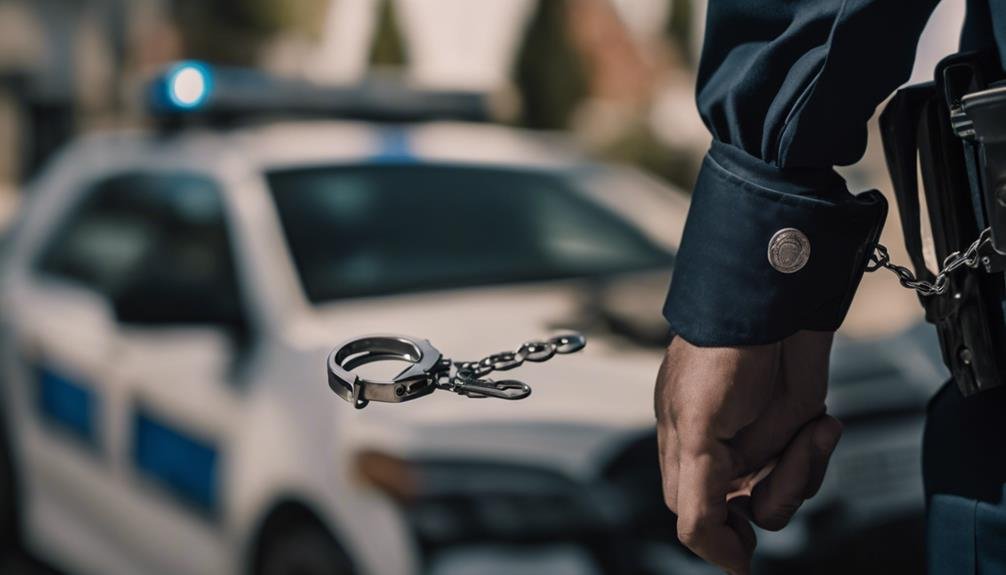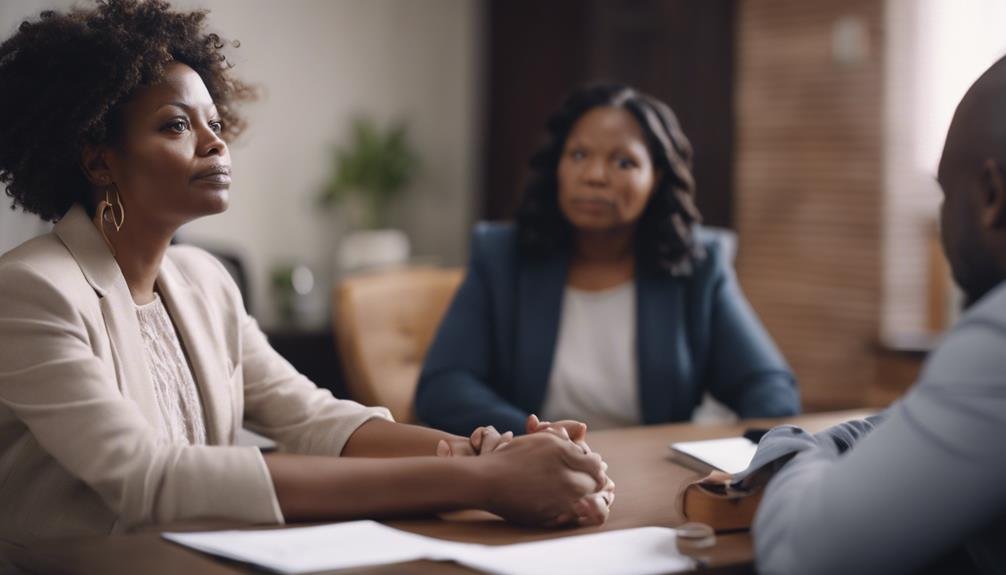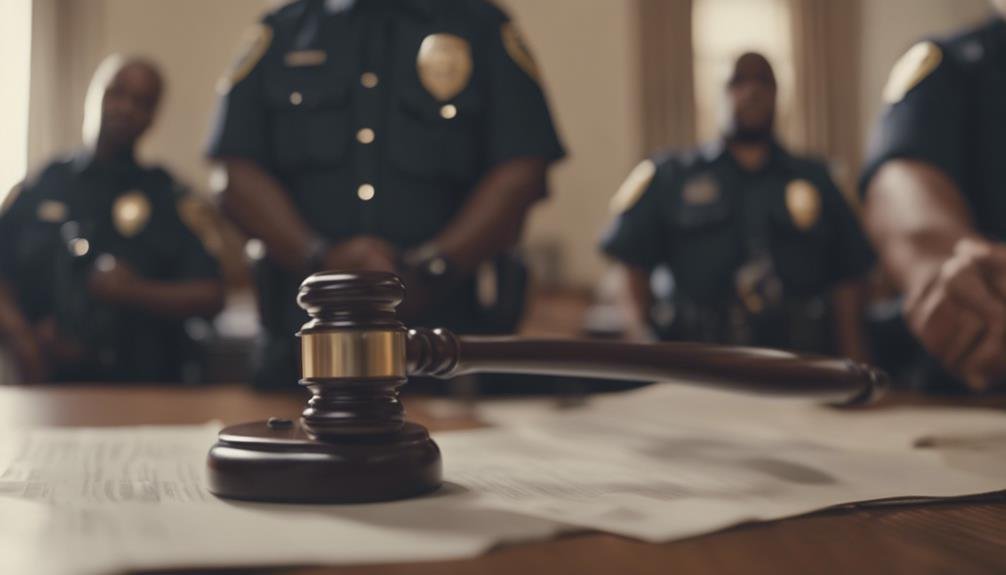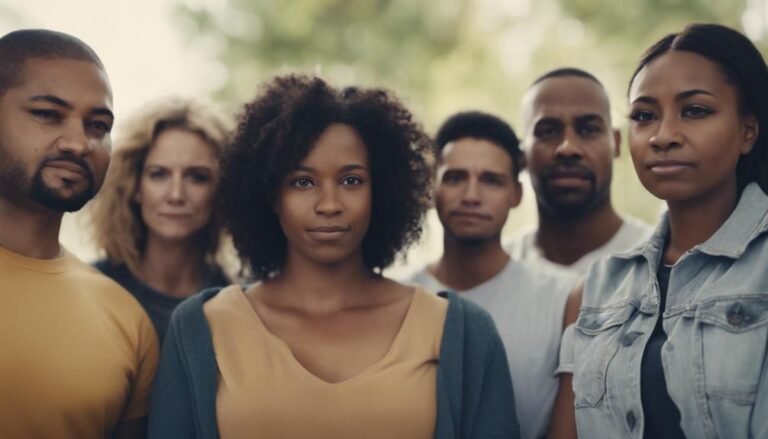Discover the seven best legal protections against domestic violence. Utilize restraining orders to establish boundaries and restrict abuser contact. Seek protection orders to halt violence and increase safety. Opt for criminal prosecution to hold perpetrators accountable. Utilize enhanced penalties like tougher sentencing for added security. Enable mandatory arrest policies for immediate intervention. Consider civil remedies for legal recourse without criminal charges. Engage legal advocacy services for vital support and representation. These legal shields empower victims and deter abusers effectively.
Key Takeaways
- Restraining orders establish clear boundaries and restrict abuser contact.
- Protection orders significantly reduce future violence and require legal representation.
- Criminal prosecution holds abusers accountable, utilizing evidence and witness testimonies.
- Enhanced penalties like tougher sentencing and bail conditions provide greater protection.
- Mandatory arrest policies increase abuser accountability and victim safety.
Restraining Orders
Restraining orders serve as essential legal safeguards for victims of domestic violence, offering protection by restricting an abuser’s contact and proximity to the survivor. These legal protections can be vital in ensuring the safety and well-being of individuals facing abusive situations.
By obtaining a restraining order, victims can establish clear boundaries that the abuser mustn’t cross, including staying away from the victim’s residence, workplace, and even their children’s school. It’s important to note that violating a restraining order carries serious consequences, such as fines or imprisonment, underscoring the significance of these legal measures.
If you find yourself in a situation where you require a restraining order, seeking assistance from law enforcement or legal services is advisable. These professionals can guide you through the process of obtaining the necessary legal protections to safeguard yourself from further harm.
Ultimately, restraining orders are effective tools in enhancing the safety and security of domestic violence survivors, providing a legal recourse to prevent unwanted contact and proximity from abusers.
Protection Orders
Protective orders, also known as protection orders, are legal tools that can effectively halt instances of violence in nearly half of domestic abuse cases, offering critical safeguards for victims in need of protection.
Securing a protective order with the help of legal aid significantly reduces the likelihood of future violence, making it an essential step for victims seeking safety. Having legal representation increases the chances of successfully obtaining a protective order, ensuring that victims have the necessary legal protection against their abusers.
Legal interventions like protective orders have shown to have a substantial impact on lowering domestic violence rates, highlighting the importance of seeking legal assistance in such situations. Civil legal aid plays a crucial role in providing the support and guidance needed for victims to navigate the legal system and obtain the protection they require against domestic violence.
Criminal Prosecution
Criminal prosecution serves as a pivotal legal mechanism for holding perpetrators of domestic violence accountable for their actions within the justice system. Through this process, prosecutors utilize evidence, witness testimonies, and relevant laws to pursue charges against individuals who’ve committed acts of domestic violence.
Charges in domestic violence cases can range from assault and battery to stalking or violation of protective orders.
For survivors of domestic violence, criminal prosecution offers a means of seeking justice, deterring future abuse, and ensuring that offenders are held responsible for their actions. Successful prosecution can lead to penalties such as fines, probation, jail time, or mandated counseling for the perpetrators.
Enhanced Penalties
Enhanced penalties for domestic violence encompass tougher sentencing laws, stricter bail conditions, and enhanced victim protection measures. These measures are intended to deter offenders, offer increased safeguards for victims, and promote accountability within the justice system.
Some states have specific legislation that mandates harsher penalties for repeat offenders, cases involving severe injuries, or the presence of firearms.
Tougher Sentencing Laws
Tougher sentencing laws, particularly those involving enhanced penalties, serve as an essential tool in deterring domestic violence offenders and ensuring accountability for their actions within the domains of criminal justice and civil legal systems. By imposing stricter consequences, such as extended prison sentences or mandatory rehabilitation programs, these laws aim to dissuade perpetrators from engaging in abusive behavior while holding them responsible for the harm they cause.
The implementation of enhanced penalties not only acts as a deterrent but also provides greater protection for survivors of domestic violence by establishing a legal framework that prioritizes their safety and well-being.
Studies have indicated that the enforcement of tougher sentencing laws can lead to a reduction in domestic violence incidents by creating a more robust deterrent effect. Incorporating enhanced penalties for offenders of domestic violence aligns with broader efforts to strengthen legal safeguards and resources available to survivors, emphasizing the importance of accountability and support within the legal system.
Stricter Bail Conditions
More stringent bail conditions for domestic violence offenders play an essential role in safeguarding victims and preventing potential harm during the legal process.
In domestic violence cases, imposing stricter bail conditions such as no-contact orders, GPS monitoring, or electronic monitoring is vital to guarantee the safety of victims. These conditions aim to prevent abusers from contacting or approaching their victims while awaiting trial or sentencing, reducing the risk of further violence.
Violating these bail conditions can lead to immediate arrest and additional criminal charges for the offender, emphasizing the seriousness of adhering to the set terms. By integrating enhanced penalties like stricter bail conditions, legal services can effectively deter perpetrators from committing additional acts of domestic violence, promoting a safer environment for victims.
Implementing these measures underscores the commitment to protecting and supporting individuals affected by domestic violence through the legal system.
Enhanced Victim Protection
Stricter penalties for domestic violence offenders under enhanced victim protection laws serve as an essential deterrent against future abuse. These laws, often including mandatory minimum sentences or increased fines for perpetrators, aim to hold abusers accountable for their actions and prioritize survivor safety. According to research by the Department of Justice, imposing harsher consequences through enhanced victim protection measures can effectively reduce rates of domestic violence.
Survivors of domestic violence stand to benefit greatly from enhanced victim protection laws, as the increased penalties can help break the cycle of abuse and provide a sense of security. By ensuring that abusers face more severe repercussions for their actions, these laws send a clear message that domestic violence won’t be tolerated.
Advocates for enhanced victim protection laws argue that by implementing stricter penalties, the legal system can better protect survivors and prevent further instances of abuse. Therefore, enhancing victim protection through stringent penalties is critical in combatting domestic violence and promoting a safer environment for survivors.
Mandatory Arrest Policies

Implementation of essential arrest policies in cases of domestic violence has been shown to greatly impact the accountability of abusers and enhance victim safety. These policies require law enforcement to arrest an abuser when probable cause is present, aiming to increase victim protection. Research indicates that jurisdictions with vital arrest policies experience a decrease in domestic violence incidents, including intimate partner homicides.
Victims are more inclined to seek help and report abuse knowing that these laws are in effect, fostering a sense of security and empowerment. By mandating arrest in domestic violence situations, perpetrators are held responsible for their actions, sending a clear message that such behavior won’t be tolerated. This proactive approach not only deters potential abusers but also provides immediate intervention and support to victims.
Civil Remedies
Civil remedies offer domestic violence survivors legal recourse through the civil court system to seek protection and justice.
These legal avenues provide survivors with the opportunity to obtain protective orders, restraining orders, and other measures aimed at preventing further abuse.
Protective orders play a vital role in ensuring the safety of survivors by prohibiting abusers from contacting or coming near them.
Importantly, survivors can pursue civil remedies even in cases where criminal charges haven’t been filed, granting them access to legal protection regardless of the criminal justice system’s involvement.
Legal Advocacy Services

Legal advocacy services play an essential role in providing domestic violence survivors with the necessary legal support and representation to navigate the complexities of seeking protection and justice. These services are vital in helping victims secure protective orders, which have been successful in stopping violence in nearly half of the cases.
Beyond addressing abuse situations, lawyers also assist victims with ancillary legal issues such as child support, housing, debt, and immigration problems that may arise from an abusive relationship. Research indicates that victims represented by attorneys in court are more likely to obtain protective orders, underscoring the effectiveness of legal services in reducing domestic violence instances.
Studies further show that legal services have a higher success rate in decreasing domestic violence compared to other interventions. The correlation between increased access to legal services and a decline in domestic violence rates emphasizes the significant role legal advocacy plays in supporting victims and combating abuse.
Frequently Asked Questions
What Does the VAWA Act Do?
The VAWA Act, essential in domestic violence prevention strategies, has revolutionized responses to gender-based violence. It enhances criminal justice measures, promotes community efforts, and provides critical resources for survivors. Its impact includes increased reporting and prosecution rates.
How Does the Government Protect Us From Domestic Violence?
You can find comfort knowing the government takes action through initiatives and community support to protect individuals from domestic violence. Legal safeguards like protective orders and consequences for violations offer vital protection to survivors in need.
Are There Laws Against Domestic Violence in Usa?
Yes, there are laws against domestic violence in the USA. Legal repercussions exist for offenders, and victim advocacy is a priority. Seek assistance from law enforcement or legal experts for support and protection in cases of domestic violence.
What Country Has the Best Domestic Violence Laws?
When comparing domestic violence laws in different countries, you’ll find varying levels of protection and support for survivors. Legal frameworks across the globe offer insights into best practices. Analyzing international perspectives reveals diverse approaches to combating intimate partner violence.
Conclusion
Overall, these legal protections are essential in helping victims of domestic violence seek safety and justice. Did you know that in the United States, an average of 20 people per minute are physically abused by an intimate partner?
By utilizing these legal avenues, victims can take steps towards breaking the cycle of abuse and holding perpetrators accountable for their actions.
It’s important to know your rights and seek help when facing domestic violence.







